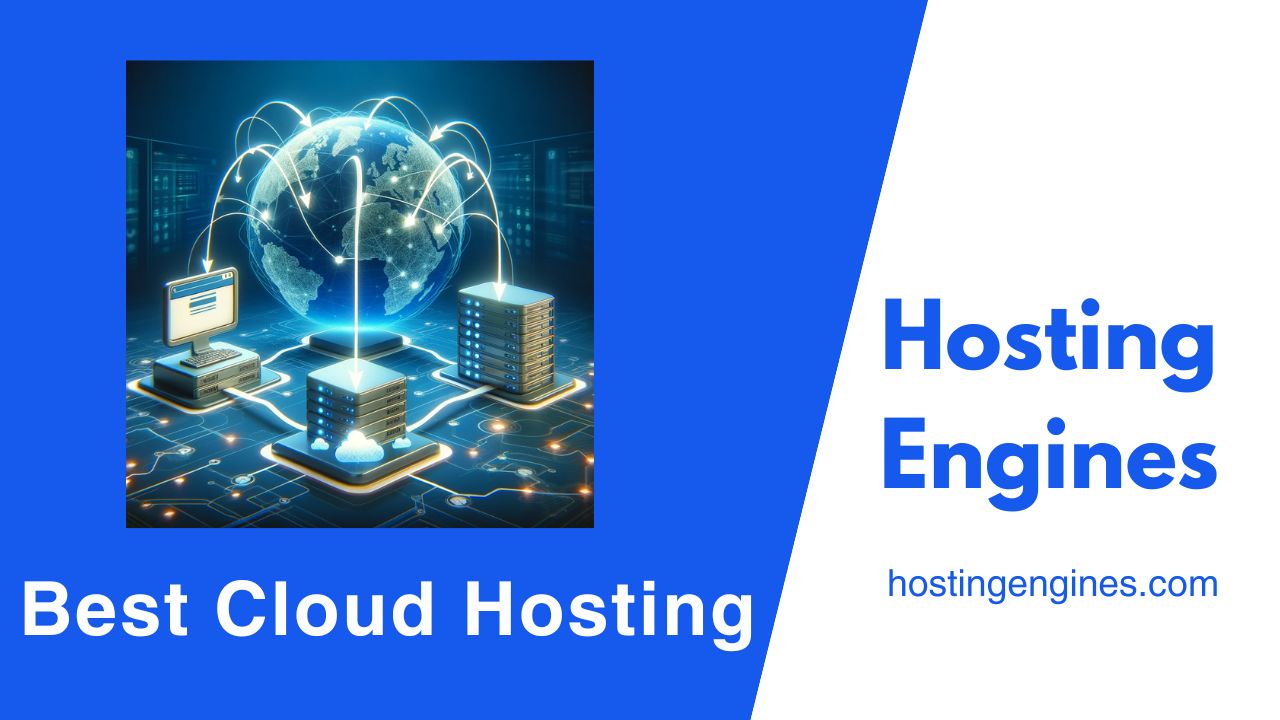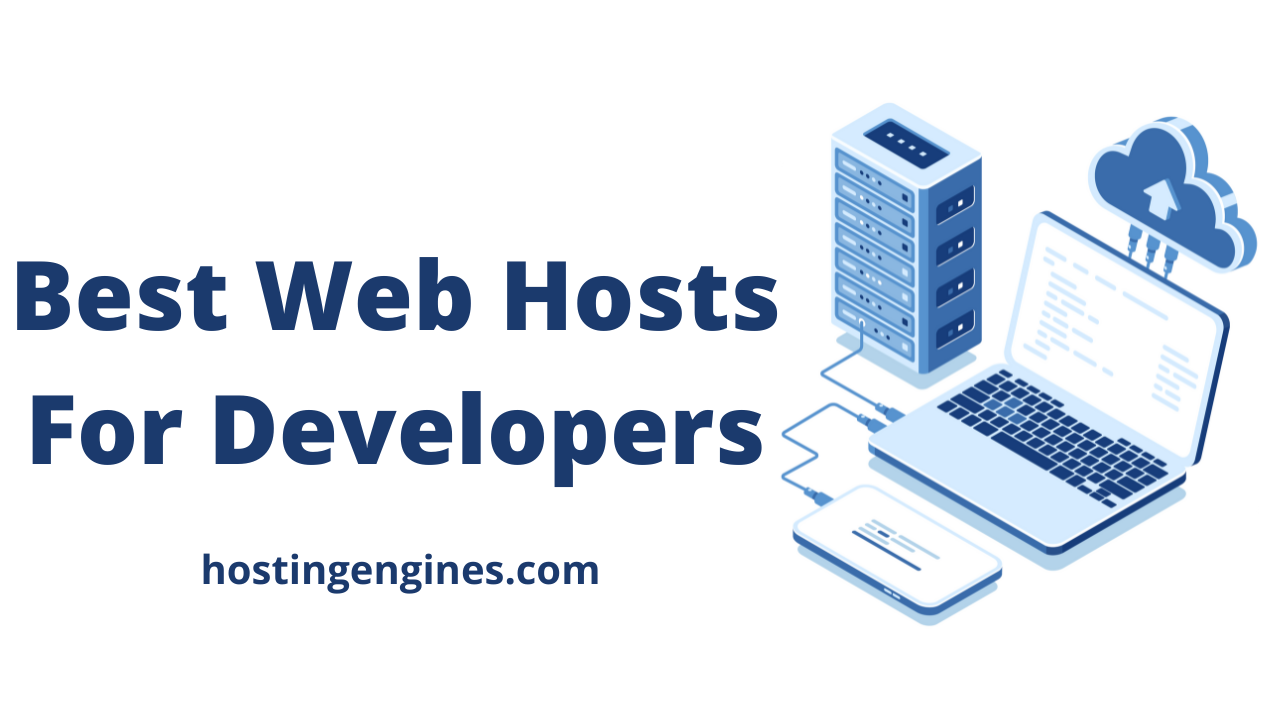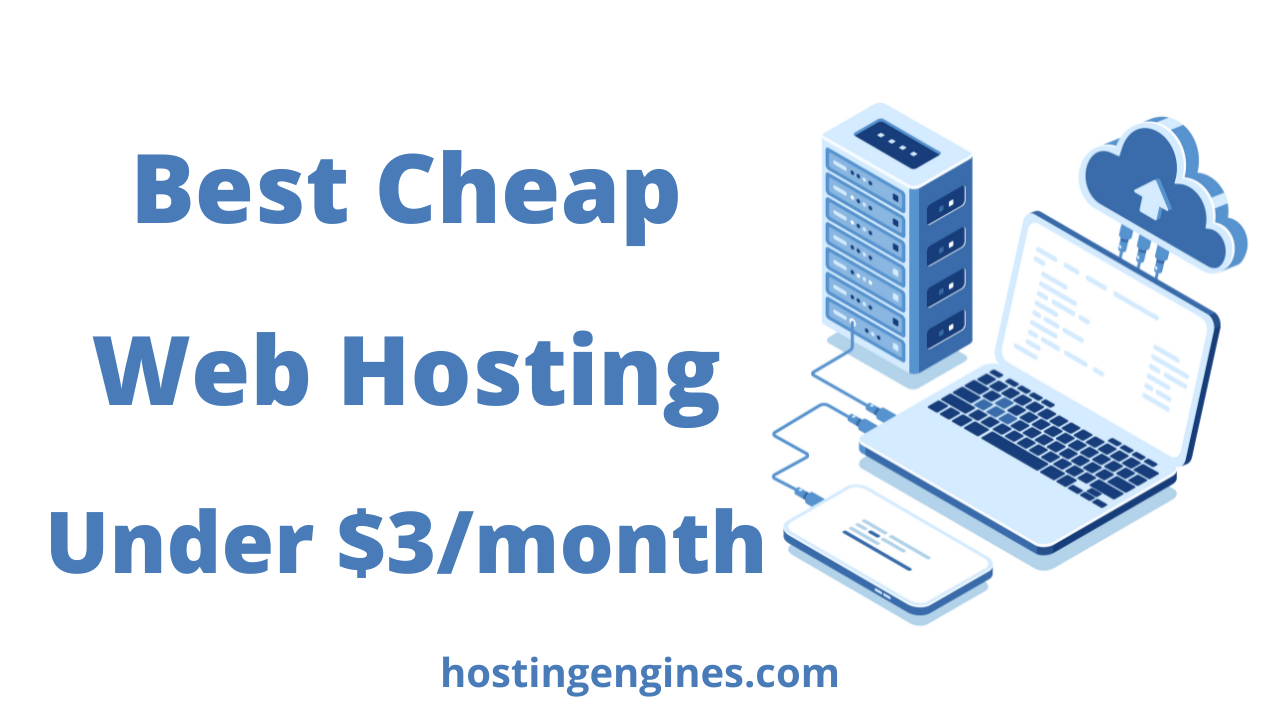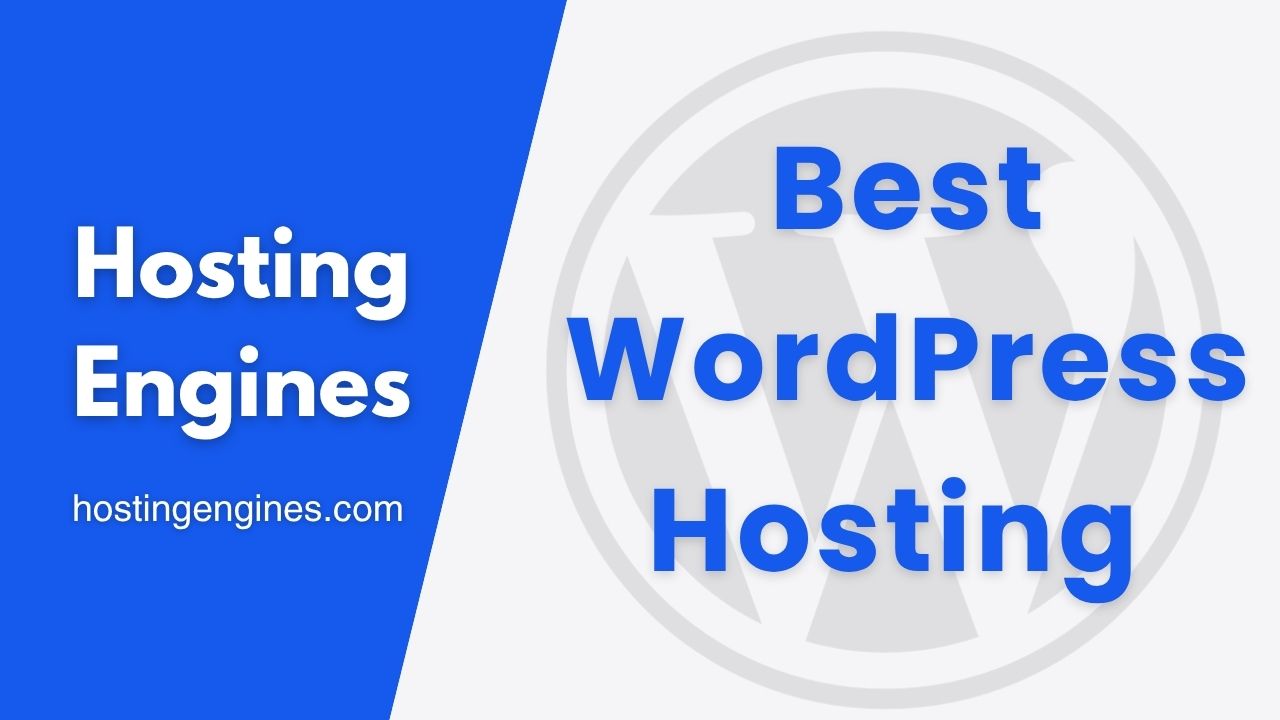Having a reliable and scalable hosting solution is crucial for any online business. Traditional hosting services often struggle to keep up with the demands of modern websites, leading to slow load times, frequent downtimes, and frustrated visitors. Cloud hosting, on the other hand, offers unparalleled performance, flexibility, and reliability.
But with so many options available, how do you choose the best one for your needs?
Don’t worry, we’ve done the hard work for you. In this article, I’ll walk you through the top cloud hosting services that can take your website to the next level. We’ll explore each provider’s unique offerings, strengths, weaknesses, and ideal use cases, helping you make an informed decision that aligns with your specific needs.
Read on to discover the best cloud hosting services that will ensure your site is always up, fast, and ready to impress your visitors.
Key takeaways
The Best Cloud Hosting Services
Below are the best cloud hosting services ordered based on several factors such as user-friendliness, support, performance, and other metrics.
1. Cloudways
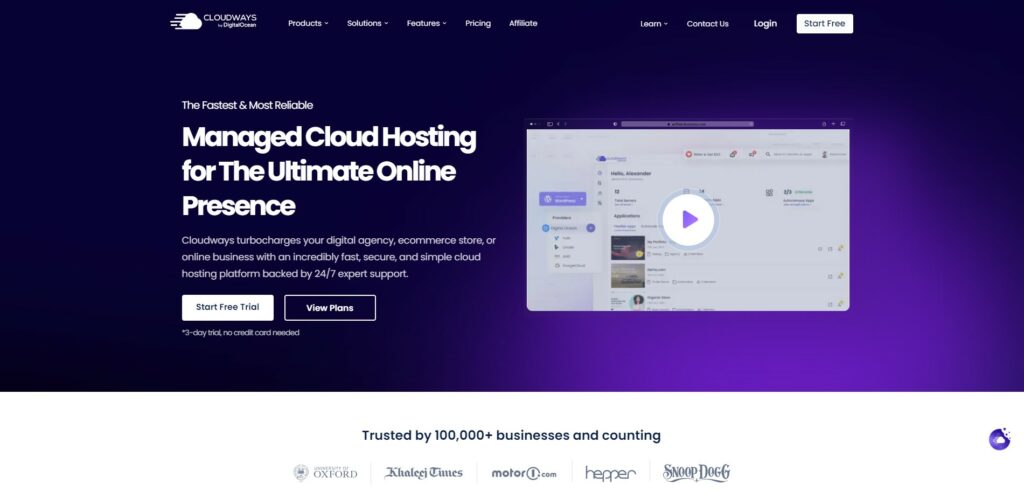
Cloudways has established itself as a unique player in the cloud hosting market by offering a managed cloud platform that simplifies the deployment and management of web applications.
Founded in 2012, Cloudways acts as an intermediary between users and cloud infrastructure providers, offering a layer of management and optimization on top of raw cloud resources. This approach allows businesses and developers to leverage the power of cloud giants like AWS, Google Cloud, and DigitalOcean without dealing with the complexities of server management.
Cloudways specializes in providing optimized stacks for popular content management systems and e-commerce platforms, including WordPress, Magento, and Laravel. Their platform includes features like built-in caches, CDN integration, and automated backups, making it particularly attractive for web developers, digital agencies, and e-commerce businesses.
By abstracting away much of the technical complexity, Cloudways enables its users to focus on building and scaling their applications rather than managing infrastructure.
Read the Cloudway review.
Cloudways features:
- Multi-cloud provider support (AWS, GCP, DigitalOcean, Vultr, Linode)
- One-click server and application deployment
- Built-in caching solutions (Varnish, Memcached, Redis)
- Free SSL certificates and CDN integration
- 24/7 support with real-time monitoring
- Team collaboration tools
- Staging environments and easy cloning
Pros:
- User-friendly interface ideal for non-technical users
- Flexible pricing with a pay-as-you-go model
- No server management headaches
- The choice of cloud providers allows for optimization of cost and performance
- Regular backups and easy restoration
Cons:
- Slightly higher prices compared to direct cloud providers
- No domain hosting included
Pricing:
Starts from $11/month for the DigitalOcean regular server with 1 CPU, 1GB RAM, 1TB bandwidth, and 25GB SSD storage space, with costs varying based on the chosen cloud provider and resources allocated to the server.
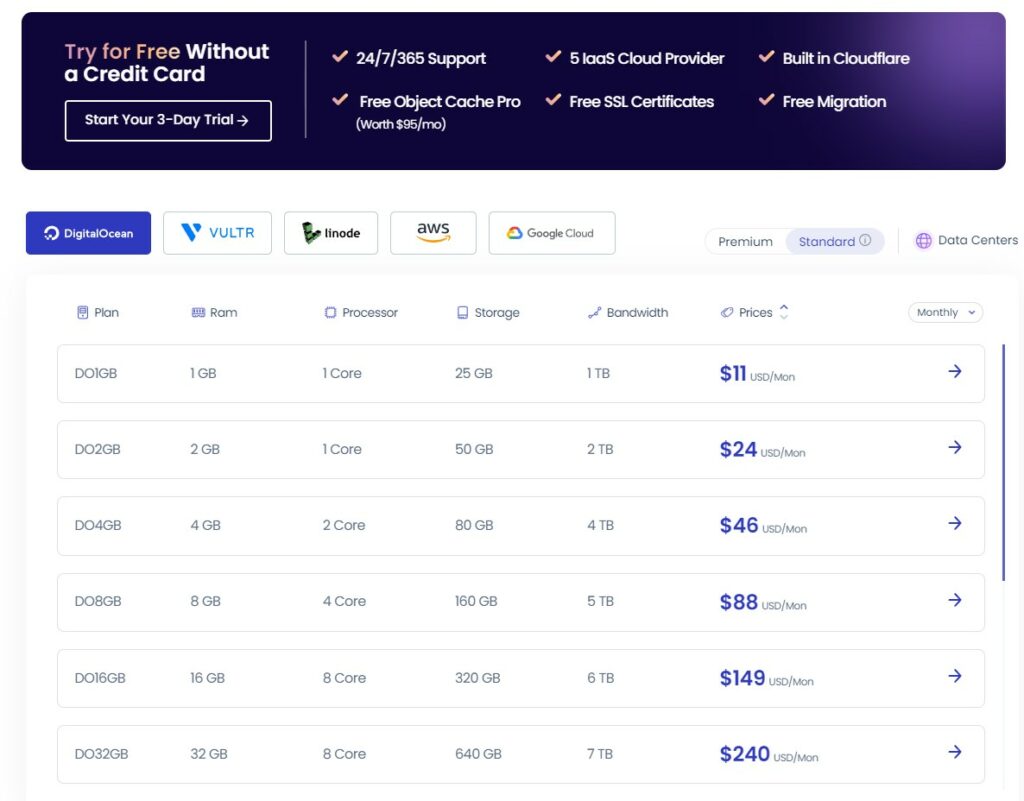
Best for:
- Small to medium-sized businesses
- E-commerce sites, particularly those running on platforms like Magento or WooCommerce
- WordPress developers and agencies
- Digital marketers managing multiple client websites
Customer support:
Cloudways offers 24/7 live chat support, a ticket system, and a knowledge base. Also, there are premium support plans available for more personalized assistance.
2. Vultr
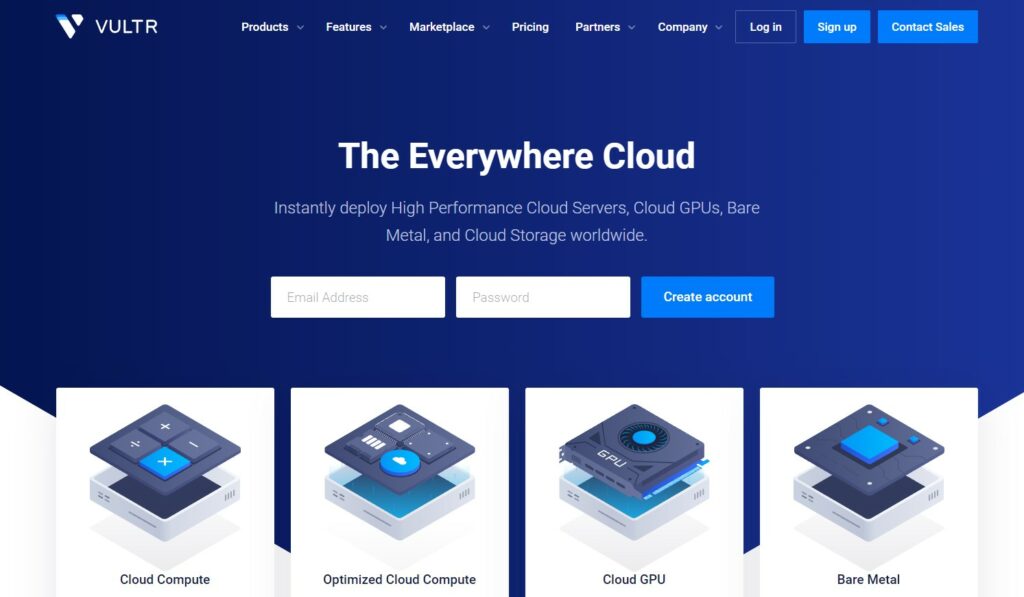
Vultr, founded in 2014, has rapidly grown to become a significant player in the cloud infrastructure market, positioning itself as a high-performance, cost-effective alternative to larger cloud providers.
Vultr offers a range of cloud computing services including virtual machines, bare metal servers, and object storage. The company has expanded its global network, now boasting data centers in over 30 locations worldwide, which allows it to provide low-latency services to a global customer base.
Vultr’s approach focuses on simplicity and performance, offering straightforward pricing and a user-friendly control panel. This has made it popular among developers, small to medium-sized businesses, and enterprises looking for specific workload solutions.
Vultr’s ability to provide both virtualized and bare metal resources gives users flexibility in choosing the right infrastructure for their needs, whether it’s for web hosting, application development, or high-performance computing tasks.
Read the Vultr review.
Vultr features:
- Bare Metal servers for high-performance computing
- Cloud Compute and Dedicated Cloud options
- A global network of 30+ data centers
- Hourly billing for flexible resource management
- One-click application deployment
- DDoS protection
- Object storage solution
Pros:
- Excellent price-to-performance ratio
- Wide range of server locations for low latency
- User-friendly control panel with an intuitive interface
- API access for automation and integration
- Customizable ISO and snapshot support
Cons:
- Limited managed services compared to some competitors
- Fewer enterprise-grade features compared to larger providers
- Less extensive documentation compared to giants like AWS or GCP
Pricing:
- Cloud Compute instances start from $2.50/month which gives 1 CPU Processor, 500 MB RAM, 500 GB Bandwidth, and 10 GB storage space.
- Bare Metal servers (CPU Compute) start from $120/month.
- Optimized Cloud Compute starts from $30/month.
- Block Storage starts from $1/month for 10 GB.
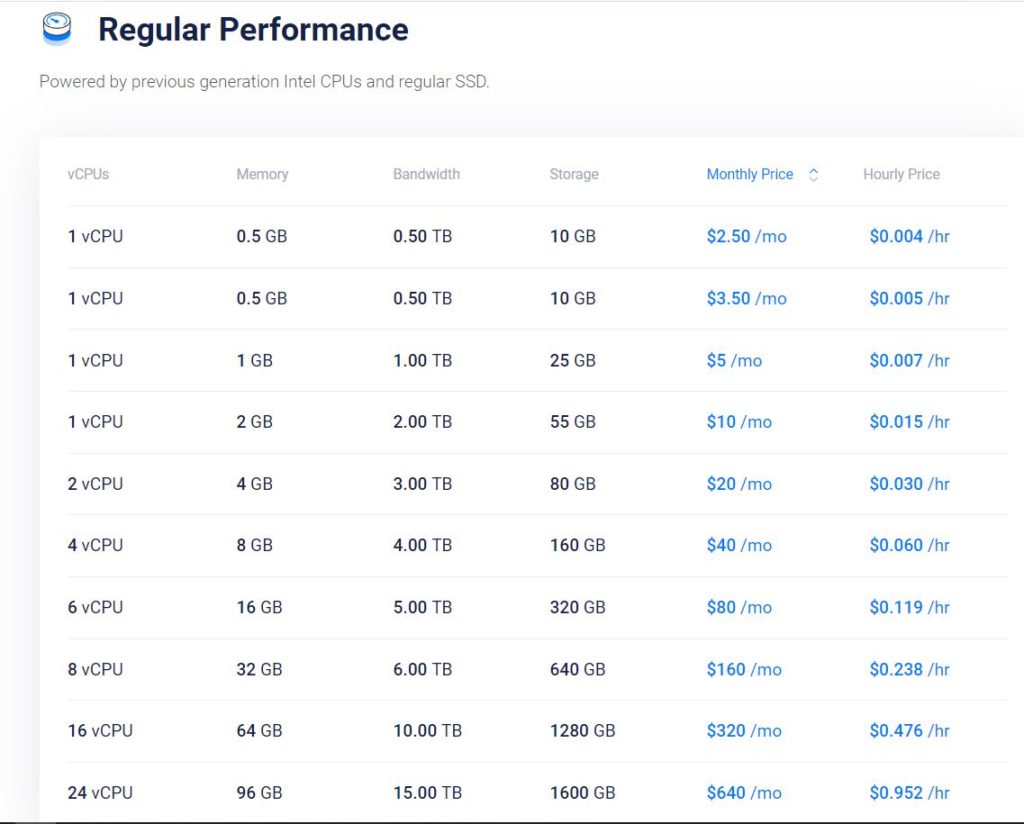
Best for:
- Developers and small to medium-sized businesses
- Companies requiring global reach with budget-friendly options
- Startups looking for scalable infrastructure
- Applications requiring low latency
Customer support:
Vultr provides 24/7 support via a ticket system, extensive documentation, and community forums.
3. DigitalOcean
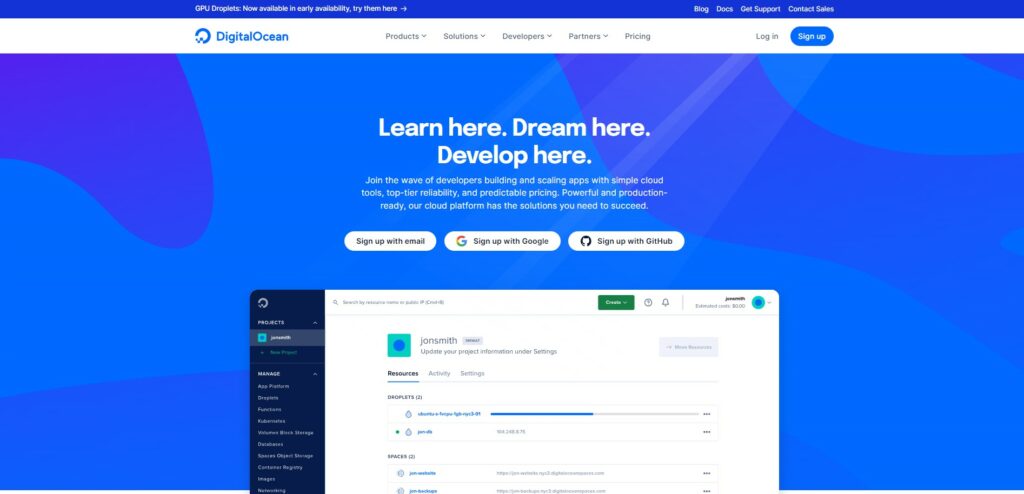
DigitalOcean, launched in 2011, has carved out a significant niche in the cloud hosting market by focusing on simplicity and developer-friendliness. The company’s mission has been to provide cloud services that developers love, with a focus on ease of use, clear pricing, and robust performance.
DigitalOcean’s core offering began with its ‘Droplets’ – virtual private servers that could be deployed in seconds. Over the years, DigitalOcean has expanded its services to include managed databases, Kubernetes clusters, and app platform services, all while maintaining its commitment to simplicity.
The company is known for its extensive library of tutorials and community-driven content, which has helped it build a loyal following among developers and small to medium-sized businesses.
DigitalOcean’s approach to cloud computing emphasizes straightforward solutions for common use cases, making it an attractive option for startups, individual developers, and companies that prefer a no-frills cloud experience.
Read the DigitalOcean review.
DigitalOcean features:
- Droplets (VMs) with SSD storage
- Kubernetes integration for container orchestration
- App Platform for easy deployment of code
- Managed databases (PostgreSQL, MySQL, Redis)
- Spaces object storage
- Load balancers and floating IPs
- Extensive API for automation
Pros:
- Simple, transparent pricing with an hourly billing option
- Developer-friendly with extensive documentation and tutorials
- Strong community support and an active Q&A platform
- Easy scalability of resources
- Global data center presence
Cons:
- Fewer services compared to larger cloud providers like AWS or Azure
- Limited enterprise-level support options
- Less suitable for complex, multi-service architectures
Pricing:
- Basic Droplets start at $4/month. Flexible pricing based on resources used.
- Kubernetes start at $12/month.
- Managed Databases start at $15/month.
- Spaces Object Storage starts at $5/month.
- Volumes Block Storage starts at $10/month for 100 GB.
- Backups are 20% of the server cost for weekly backups and 30% for the daily backups.
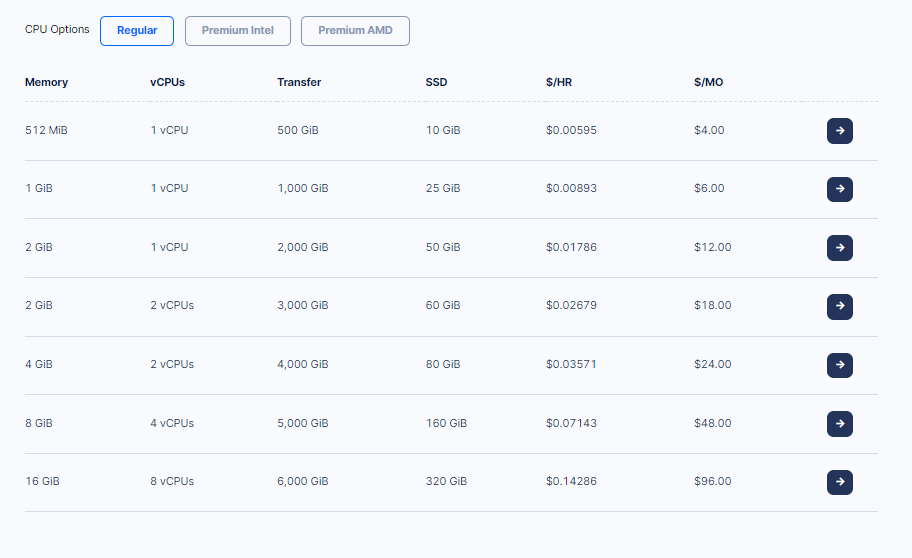
Best for:
- Developers and development teams
- Startups and small to medium-sized applications
- Educational institutions and coding bootcamps
- Businesses requiring simple, cost-effective cloud solutions
Customer support:
DigitalOcean offers community support, ticket-based technical support, and paid premium support options.
4. Linode

Linode founded in 2003, is one of the oldest cloud hosting providers in the market. Now a part of Akamai Technologies, Linode has maintained its reputation for providing high-performance, cost-effective cloud computing services with a focus on Linux-based infrastructure.
The company has consistently positioned itself as an alternative to larger cloud providers, offering a more personalized experience and straightforward approach to cloud hosting.
Linode services have evolved from basic virtual private servers to a comprehensive cloud platform including object storage, managed Kubernetes, and bare metal servers.
The company is known for its strong performance, particularly in I/O operations, making it a favorite among developers and businesses running data-intensive applications.
Linode’s commitment to open-source technologies and its developer-centric approach has helped it maintain a loyal customer base even as the cloud market has become increasingly competitive.
Read the Linode review.
Linode features:
- High-performance SSD storage
- Object storage for scalable data management
- Kubernetes support for container orchestration
- GPU instances for intensive computing tasks
- DDoS protection included on all plans
- Global data centers
- Bare Metal servers
Pros:
- Competitive pricing with a simple, transparent structure
- Consistent performance and reliability
- Simple and intuitive interface
- Excellent documentation and guides
- Strong focus on privacy and data protection
Cons:
- Fewer advanced features compared to larger providers
- Limited managed database options
- Smaller global presence compared to some competitors
Pricing:
- Shared CPU instances start at $5/month.
- Dedicated CPU instances start from $36/month.
- High-memory plans start from $60/month.
- Premium CPU plans start from $43/month.
- GPU plans start from $1,000/month.
- Linode Kubernetes Engine (LKE) starts from $108/month.
- Block Storage starts at $1/month for 10 GB of storage space.
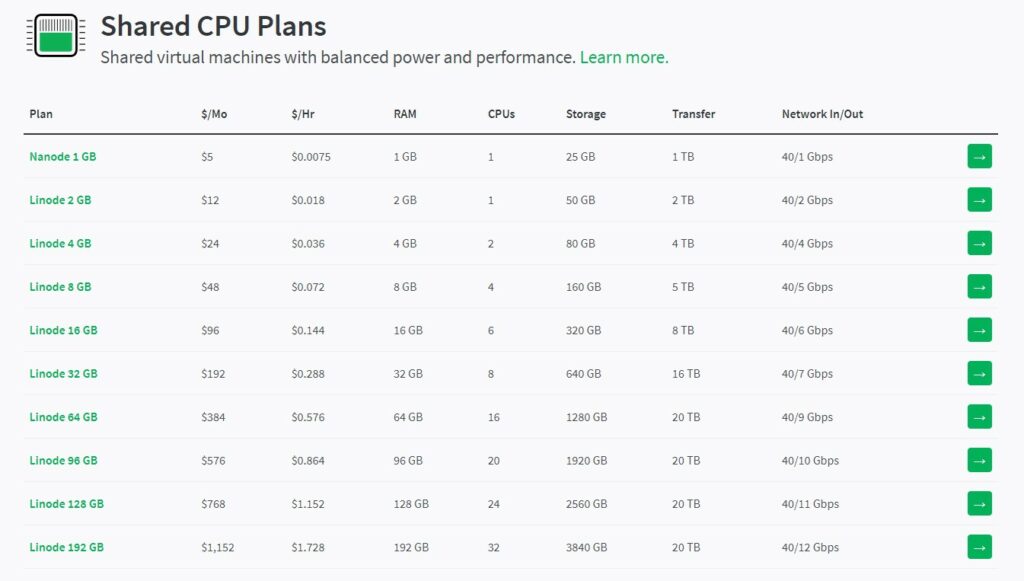
Best for:
- Linux enthusiasts and system administrators
- Developers and small to medium-sized businesses
- Applications requiring reliable performance
- Businesses looking for cost-effective bare metal solutions
Customer support:
Linode provides 24/7 phone and ticket support, extensive documentation, and community forums.
5. Amazon Web Services (AWS)
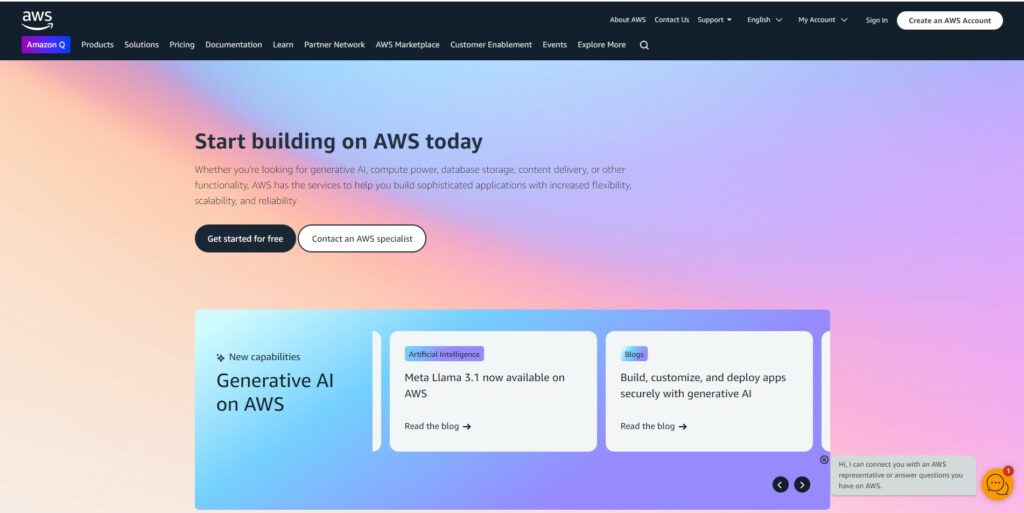
Amazon Web Services, launched in 2006, has grown to become the largest and most comprehensive cloud platform in the world. What started as a side project for Amazon to monetize its excess server capacity has transformed into a juggernaut that powers a significant portion of the internet.
AWS offers over 200 fully featured services from data centers globally, covering computing, storage, databases, analytics, machine learning, Internet of Things (IoT), mobile, security, and enterprise applications.
AWS’s vast array of services and its ability to handle massive scale has made it the go-to choice for enterprises, governments, and startups alike. The platform is known for its rapid pace of innovation, frequently releasing new services and features. AWS’s market leadership is built on its first-mover advantage, extensive global infrastructure, and the breadth and depth of its service offerings.
Despite increasing competition, AWS continues to maintain a significant market share in the cloud computing industry.
AWS features:
- Extensive range of services (200+) covering compute, storage, database, analytics, machine learning, IoT, and more
- Global infrastructure with multiple regions and availability zones
- Advanced security features and compliance certifications
- Flexible pricing models including pay-as-you-go, reserved instances, and spot instances
- AWS Lambda for serverless computing
- Comprehensive tools for big data analytics and AI/ML
Pros:
- Comprehensive solution for almost any cloud need
- Unmatched scalability and reliability
- Large ecosystem of tools, partners, and third-party integrations
- Extensive documentation and learning resources
- Strong enterprise-grade features and support options
Cons:
- Can be complex for beginners
- Costs can escalate quickly if not managed properly
- Steeper learning curve compared to simpler providers
Pricing:
AWS offers a pay-as-you-go approach for pricing for the vast majority of our cloud services. AWS pricing varies widely based on the services used. For example, EC2 instances start from a few cents per hour.
You can use their pricing calculator to estimate the cost of the servers you need to deploy on their platform.
Best for:
- Enterprises requiring a wide range of cloud services
- Startups looking to scale rapidly
- Applications with complex architectures or high computational needs
- Businesses requiring advanced analytics, AI, or machine learning capabilities
Customer support:
AWS offers various support plans, from basic to enterprise-level, with 24/7 support options available.
6. Google Cloud Platform (GCP)

Google Cloud Platform launched in 2008, leverages Google’s massive infrastructure to provide cloud computing services. GCP has positioned itself as a strong competitor in the cloud market, particularly excelling in areas like data analytics, artificial intelligence, and machine learning.
The platform benefits from Google’s expertise in handling big data and its innovations in areas like Kubernetes, which has become an industry standard for container orchestration.
GCP’s approach to the cloud market emphasizes its network capabilities, security model, and commitment to open source. The platform is known for its strong performance in data-intensive operations and its advanced tools for data analytics and machine learning. Google’s global network of fiber-optic cables gives GCP an edge in data transfer speeds and global reach.
While it entered the market later than some competitors, GCP has been gaining market share, particularly among companies looking to leverage cutting-edge technologies in AI and data analytics.
GCP features:
- Compute Engine for VM instances
- Google Kubernetes Engine for container management
- BigQuery for big data analytics
- TensorFlow and AI Platform for Machine Learning
- Global fiber network for fast data transfer
- Live migration of virtual machines
- Strong focus on sustainability with carbon-neutral operations
Pros:
- Cutting-edge technology in AI and machine learning
- Excellent network performance and global reach
- Competitive pricing with sustained use discounts
- Strong integration with other Google services
- Advanced data analytics capabilities
Cons:
- Smaller service catalog compared to AWS
- Less extensive global infrastructure compared to some competitors
- Can be complex for those not familiar with Google’s ecosystem
Pricing:
Similar to AWS pricing, GCP offers flexible pricing with per-second billing. For example, Compute Engine instances start from a few cents per hour. And you can use their pricing calculator to estimate the cost of their services.
Best for:
- Organizations heavily invested in Google’s ecosystem
- Businesses focusing on big data and analytics
- Startups and enterprises requiring strong machine learning capabilities
- Applications needing high-performance networking
Customer support:
GCP offers various support plans, including 24/7 support for higher-tier plans, extensive documentation, and community forums.
7. Microsoft Azure
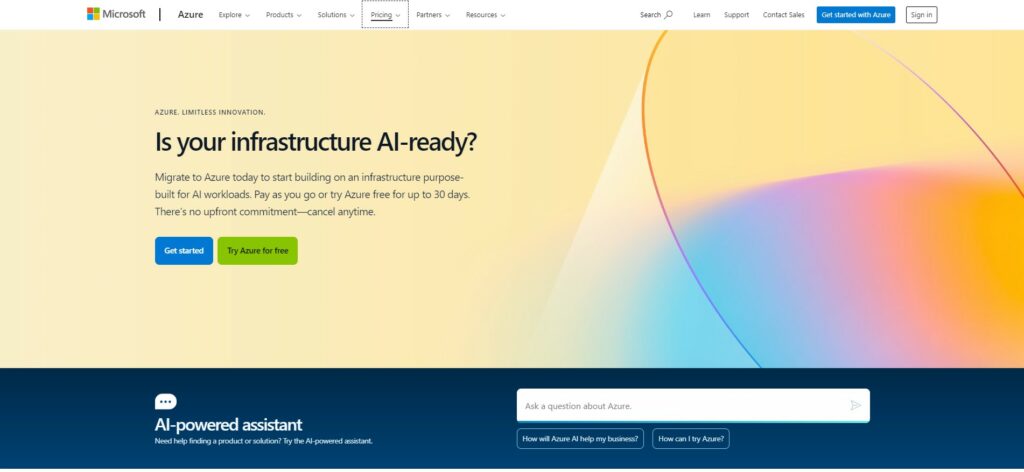
Microsoft Azure, launched in 2010, has grown to become one of the leading cloud platforms globally, leveraging Microsoft’s long-standing relationships with enterprises and its strong presence in the software market.
Azure offers a comprehensive set of cloud services that integrate seamlessly with Microsoft’s vast ecosystem of products, including Windows Server, Active Directory, and Office 365.
Azure’s strength lies in its hybrid cloud capabilities, allowing businesses to seamlessly integrate on-premises data centers with cloud resources. This approach has made Azure attractive to large enterprises that are gradually transitioning to the cloud.
The platform has also made significant strides in areas like AI, IoT, and edge computing. Azure’s commitment to supporting both Windows and Linux environments, along with its strong focus on enterprise-grade security and compliance, has helped it capture a significant portion of the cloud market, especially among businesses already invested in Microsoft technologies.
Microsoft Azure features:
- Wide range of compute options including VMs, containers, and serverless
- Azure Active Directory for identity and access management
- Strong in the hybrid cloud with Azure Arc
- Extensive AI and machine learning services
- Integration with Microsoft 365 and other Microsoft products
- Azure DevOps for streamlined development processes
Pros:
- Seamless integration with Microsoft technologies
- Strong in hybrid and multi-cloud scenarios
- Robust security features and compliance certifications
- Extensive enterprise-grade capabilities
- Good support for open-source technologies
Cons:
- Can be more expensive than some competitors for certain workloads
- Complex licensing model
- Steeper learning curve for those not familiar with Microsoft technologies
Pricing:
Microsoft Azure offers a Pay-as-you-go model with various discounts available. Azure Virtual Machines (VM) instances start from a few cents per hour.
Best for:
- Enterprises already using Microsoft products
- Organizations requiring robust hybrid cloud solutions
- Businesses with complex compliance and security needs
- Developers working with .NET and other Microsoft technologies
Customer support:
Azure offers various support plans, including 24/7 support for higher-tier plans, extensive documentation, and community resources.
8. IBM Cloud
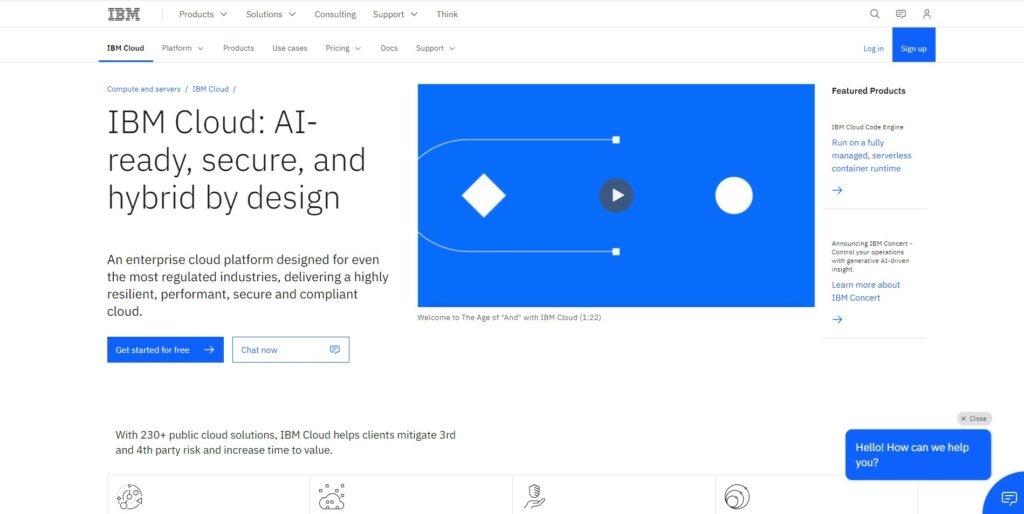
IBM Cloud evolved from IBM’s acquisition of SoftLayer in 2013, representing the tech giant’s foray into the cloud computing market. IBM’s approach to cloud services is heavily influenced by its long history in enterprise IT and its strengths in areas like AI, blockchain, and quantum computing.
The IBM Cloud platform offers a mix of Infrastructure as a Service (IaaS), Platform as a Service (PaaS), and Software as a Service (SaaS) solutions.
What sets IBM Cloud apart is its strong focus on hybrid and multi-cloud environments, recognizing that many large enterprises prefer to keep certain workloads on-premises while moving others to the cloud.
IBM’s acquisition of Red Hat in 2019 further strengthened its position in the hybrid cloud market. The platform is known for its robust enterprise-grade solutions, particularly in highly regulated industries like finance and healthcare.
IBM Cloud also leverages the company’s Watson AI technology, offering advanced analytics and machine learning capabilities integrated into its cloud services.
IBM Cloud features:
- Bare metal and virtual servers
- IBM Watson for AI and machine learning
- Blockchain platform
- Quantum computing services
- Strong focus on hybrid and multi-cloud deployments
- Extensive database and analytics offerings
Pros:
- Robust enterprise-grade solutions
- Strong in AI, blockchain, and emerging technologies
- Excellent for hybrid cloud deployments
- High level of customization available
Cons:
- Can be more expensive than some competitors
- Smaller public cloud market share compared to AWS, Azure, and GCP
- Interface and documentation can be complex for beginners
Pricing:
IBM Cloud pricing varies based on the services you choose They offer a Pay-As-You-Go payment approach. Their Virtual servers start from around $0.10 per hour for North American datacenters.
Check out their cost estimator to find the cost estimate for the configuration that suits you best.
Best for:
- Large enterprises with complex IT needs
- Organizations requiring advanced AI or blockchain solutions
- Businesses in highly regulated industries
- Companies looking for strong hybrid cloud options
Customer support:
IBM offers various support tiers, including 24/7 support for higher-tier plans, extensive documentation, and community forums.
9. Oracle Cloud
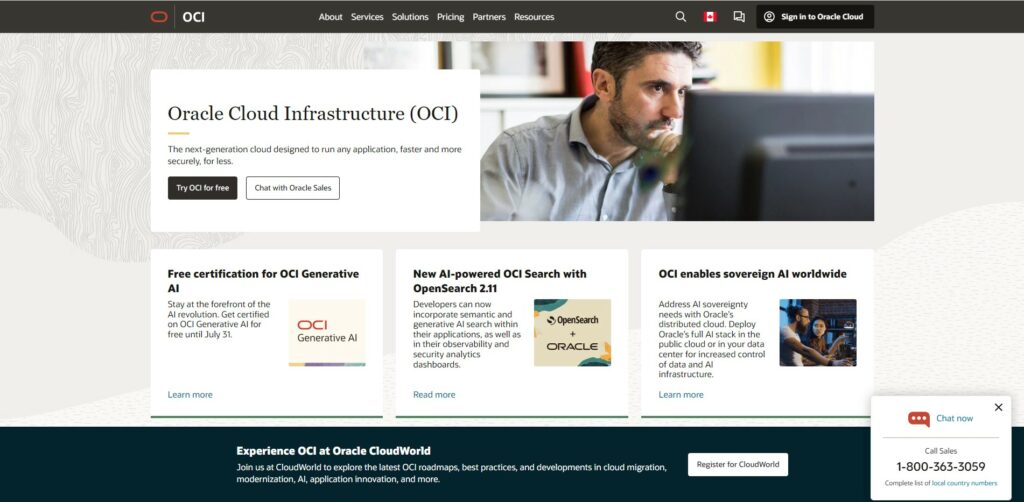
Oracle Cloud, while a relatively late entrant to the public cloud market, has rapidly evolved to become a significant player, especially in the enterprise segment. Launched in 2016, Oracle Cloud leverages the company’s strong database technology and enterprise software expertise to offer a comprehensive suite of cloud services.
Oracle’s approach to cloud computing emphasizes performance, particularly for database workloads, and tight integration with its popular enterprise applications.
Oracle Cloud has made significant investments in expanding its global infrastructure and has been aggressive in its pricing strategy to compete with larger cloud providers. The platform is known for its Autonomous Database, which uses machine learning to automate database tuning, security, backups, updates, and other routine management tasks.
Oracle’s cloud offerings are particularly attractive to businesses already using Oracle’s database or enterprise software solutions, as they provide a seamless path to cloud migration. The company has also been focusing on emerging technologies like AI, machine learning, and blockchain, integrating these capabilities into its cloud platform.
Oracle Cloud features:
- High-performance compute instances
- Autonomous Database
- Oracle Cloud VMware Solution
- Strong in enterprise resource planning (ERP) and customer relationship management (CRM)
- Bare metal servers
- Cloud Native services including Kubernetes
Pros:
- Excellent performance for database workloads
- Competitive pricing, especially for Oracle workloads
- Strong integration with Oracle’s software suite
- Free tier with generous always-free services
Cons:
- Smaller ecosystem compared to leading cloud providers
- Less extensive global infrastructure
- Steeper learning curve for those not familiar with Oracle technologies
Pricing:
Oracle Cloud offers flexible pricing with pay-as-you-go options. For instance, Compute instances start from a few cents per hour. Check their pricing cost estimator.
Best for:
- Organizations already using Oracle databases and applications
- Enterprises requiring high-performance database solutions
- Businesses looking for cost-effective alternatives to major cloud providers
- Companies in sectors like finance, healthcare, and telecommunications
Customer support:
Oracle provides various support plans, including 24/7 support for higher-tier plans, extensive documentation, and community resources.
10. Alibaba Cloud

Alibaba Cloud, also known as Aliyun, was established in 2009 and has grown to become the largest cloud provider in China and a big player in the global cloud market.
As the cloud computing arm of Alibaba Group, it has leveraged the massive scale of Alibaba’s e-commerce operations to build a robust and scalable cloud platform.
Alibaba Cloud offers a comprehensive suite of cloud services, including elastic computing, storage, database, big data processing, AI, and IoT services.
The platform’s strength lies in its dominant position in the Chinese market and its growing presence in other Asian countries. This makes Alibaba Cloud an attractive option for businesses looking to expand into the Asian market.
The company has also been expanding globally, with data centers across Asia, Europe, the Middle East, and North America. Alibaba Cloud is known for its high-performance infrastructure, competitive pricing, and innovations in areas like cloud-native technologies and edge computing.
Its experience in handling massive scale, particularly during events like Singles’ Day (the world’s largest online shopping event), demonstrates its capability to manage high-volume, high-concurrency scenarios.
Alibaba Cloud features:
- Elastic Compute Service (ECS) for scalable computing power
- Object Storage Service (OSS) for cloud storage
- ApsaraDB for database services
- Content Delivery Network (CDN)
- Big data and AI services
- Strong presence in the Asia-Pacific region
Pros:
- An excellent option for businesses targeting the Chinese market
- Competitive pricing
- Strong performance in the Asia-Pacific region
- Growing global presence
- A comprehensive range of cloud services
Cons:
- Less established presence in Western markets
- Documentation and support primarily in Chinese, with English support improving
- Potential concerns over data sovereignty for some organizations
Pricing:
Alibaba Cloud offers competitive pricing with a pay-as-you-go billing option. ECS instances start from a few cents per hour.

Best for:
- Businesses expanding into Asian markets, especially China
- Organizations requiring strong cloud infrastructure in the Asia-Pacific region
- Companies looking for cost-effective alternatives to Western cloud providers
- E-commerce businesses leveraging Alibaba’s ecosystem
Customer support:
Alibaba Cloud offers various support plans, including 24/7 support for higher-tier plans, documentation in multiple languages, and community forums.
11. Hetzner
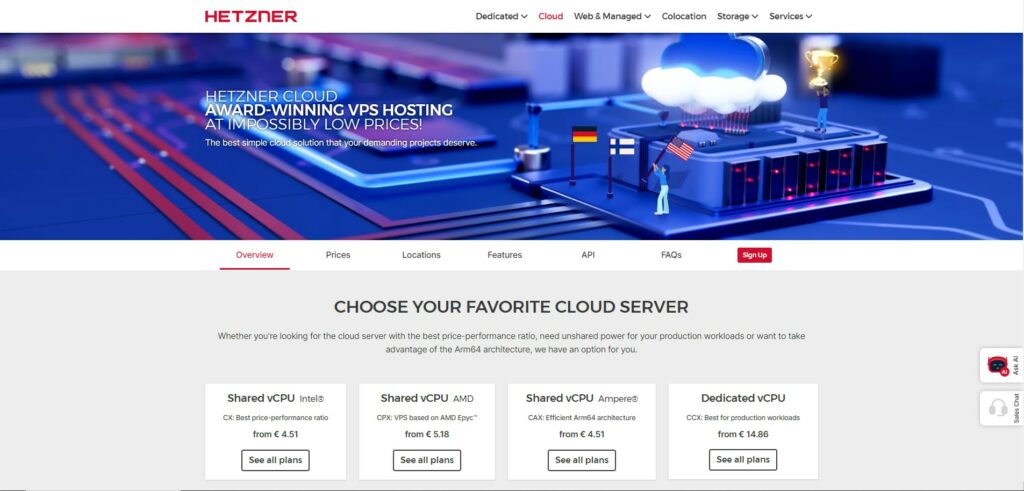
Hetzner founded in 1997 in Germany, has built a reputation as a provider of high-value, low-cost hosting and cloud services.
While it started as a web hosting company, Hetzner has expanded its offerings to include dedicated servers, colocation services, and cloud hosting. The company has gained popularity, particularly in Europe, for its exceptionally competitive pricing and reliable performance.
Hetzner’s approach to the cloud market emphasizes simplicity and cost-effectiveness. Its cloud platform offers straightforward virtual private servers with flexible configurations, appealing to developers, small businesses, and cost-conscious startups.
While Hetzner may not offer the extensive range of services provided by larger cloud providers, it has carved out a niche by focusing on core hosting services and delivering them efficiently and affordably.
Hetzner’s commitment to providing high-quality services at budget-friendly prices has earned it a loyal customer base, particularly among tech-savvy users who don’t require extensive managed services.
Hetzner features:
- Cloud servers with flexible configurations
- Dedicated root servers
- Colocation services
- Storage boxes for additional storage
- Simple and straightforward control panel
Pros:
- Excellent pricing, often significantly cheaper than major providers
- Good performance for the price
- Straightforward and easy-to-use interface
- Generous bandwidth allocations
Cons:
- Limited global presence, primarily focused on Europe
- Fewer advanced features compared to larger cloud providers
- Limited managed services
Pricing:
Hetzner is known for its competitive pricing. Their shared CPU started at €3.79 per month for a server of 2 vCPU, 4 GB RAM, 40 GB NVMe SSD storage, and 20 TB traffic.
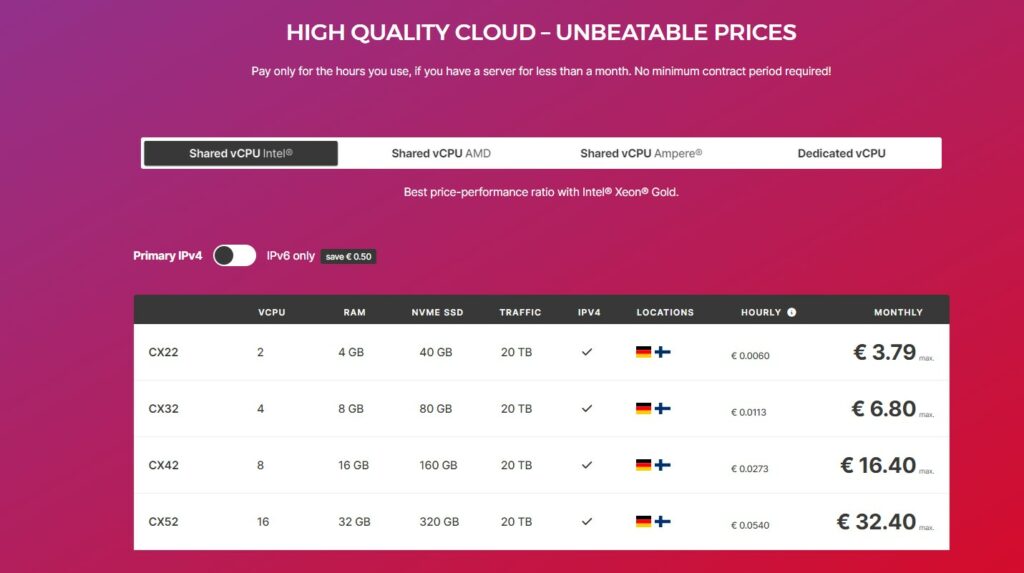
Best for:
- Budget-conscious developers and small businesses
- European companies looking for affordable hosting solutions
- Projects requiring good performance at a low cost
- Startups and individuals with basic to moderate hosting needs
Customer support:
Hetzner provides support via email and ticket system, along with extensive documentation and community forums.
12. OVHcloud
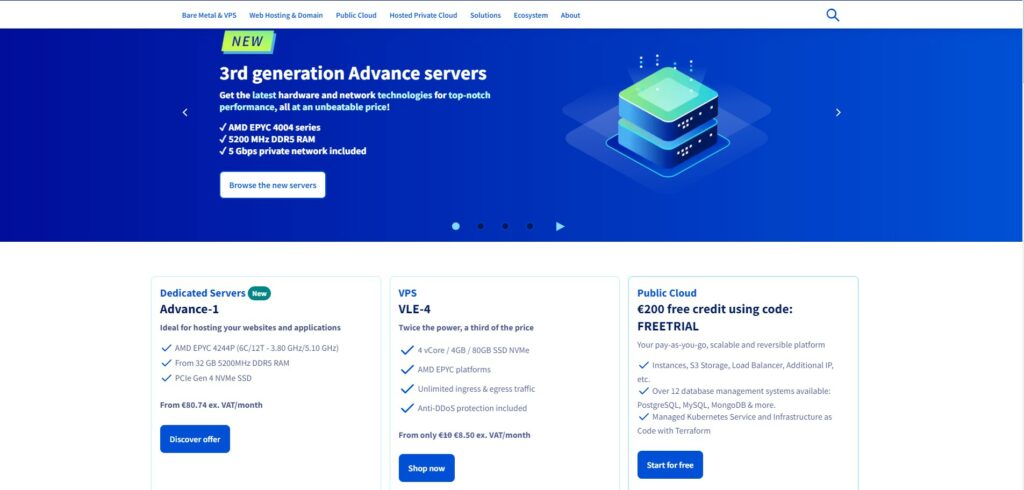
OVHcloud, founded in 1999 in France, has grown to become one of Europe’s largest cloud providers. The company started as a web hosting provider and has since expanded its offerings to include a full range of cloud services, including public and private cloud, bare metal servers, and web hosting solutions.
OVHcloud has positioned itself as a European alternative to U.S.-based cloud giants, with a strong focus on data sovereignty and GDPR compliance.
What sets OVHcloud apart is its commitment to owning and operating its own global network of data centers and fiber optic networks, giving it greater control over its infrastructure and costs. This vertical integration allows OVHcloud to offer competitive pricing while maintaining high-performance standards.
The company is known for its strong presence in the European market and its efforts to promote digital sovereignty, making it a popular choice for European businesses and organizations concerned about data privacy and compliance with EU regulations. OVHcloud also emphasizes sustainability, with initiatives to reduce the environmental impact of its data centers.
OVHcloud features:
- Public and private cloud offerings
- Bare metal servers
- Web hosting solutions
- Object storage and archive storage
- OpenStack-based cloud
- Strong focus on data privacy and GDPR compliance
Pros:
- Competitive pricing, especially for European customers
- Strong emphasis on data sovereignty
- Good performance-to-price ratio
- Variety of hosting options from simple to complex
Cons:
- Smaller global presence compared to major providers
- Less extensive service catalog compared to larger cloud providers
- The interface can be less intuitive for beginners
Pricing:
OVHcloud offers competitive pricing with various options. Public cloud instances start from a few euros per month. The General Purpose compute starts at €0.0465/hour.

Best for:
- European businesses concerned about data sovereignty
- Organizations looking for cost-effective bare metal solutions
- Small to medium-sized businesses requiring a range of hosting options
- Companies needing GDPR-compliant cloud solutions
Customer support:
OVHcloud offers various support options, including 24/7 support for higher-tier plans, documentation, and community forums.
What to Consider When Choosing a Cloud Hosting Provider?
- Scalability: How easily can you scale resources up or down? Look for providers that offer seamless scaling options to accommodate your growth.
- Performance: What kind of performance metrics does the provider offer? Consider aspects like uptime guarantees, network speed, and compute power.
- Pricing: Is the pricing model transparent and aligned with your budget? Look beyond just the base price and consider factors like data transfer costs, storage fees, and potential discounts for long-term commitments.
- Ease of Use: How user-friendly is the platform? This is particularly important if you have a team with varying levels of technical expertise.
- Geographic Reach: Does the provider have data centers in regions relevant to your target audience? This can significantly impact latency and compliance with data residency requirements.
- Security and Compliance: What security measures and compliance certifications does the provider offer? This is crucial, especially for businesses in regulated industries.
- Support: What level of customer support is available? Consider factors like response times, available communication channels, and the quality of documentation and community resources.
- Ecosystem and Integrations: Does the provider offer a wide range of services and integrations that align with your technology stack and future needs?
- Specialization: Does the provider specialize in services that are particularly relevant to your needs, such as AI/ML capabilities, database management, or specific programming languages?
- Vendor Lock-in: How easy is it to migrate your data and applications to or from the provider? Consider the long-term implications of your choice.
Features of Cloud Hosting
- Scalability and Flexibility: Cloud hosting allows businesses to easily scale resources up or down based on demand. This elasticity ensures that you only pay for what you use and can quickly adapt to traffic spikes or growing business needs.
- Cost-Effectiveness: With cloud hosting, companies can significantly reduce their capital expenditure on hardware and infrastructure. The pay-as-you-go model allows for better budget management and can lead to substantial cost savings.
- Reliability and High Availability: Cloud providers offer robust infrastructure with built-in redundancy and failover mechanisms. This results in higher uptime and improved reliability compared to traditional hosting solutions.
- Global Reach: Major cloud providers have data centers worldwide, allowing businesses to deploy applications closer to their target audience, reducing latency and improving user experience.
- Advanced Security Measures: Cloud providers invest heavily in security, offering features like encryption, firewalls, and regular security updates. This can provide better protection than many organizations could achieve on their own.
Cloud Hosting vs. VPS Hosting
VPS and Cloud hosting seem similar, in most cases, they offer dedicated resources on a shared physical server. However, Cloud hosting is ahead of VPS servers in many aspects:
1. Resource allocation:
- Cloud Hosting: Resources are distributed across multiple servers, offering more flexibility and scalability.
- VPS Hosting: Resources are allocated from a single physical server, which is partitioned into multiple virtual servers.
2. Scalability:
- Cloud Hosting: Offers on-demand scalability, allowing resources to be adjusted in real-time.
- VPS Hosting: Scaling often requires upgrading to a new plan or migrating to a different server.
3. Pricing model:
- Cloud Hosting: Typically follows a pay-as-you-go model, charging for actual resource usage.
- VPS Hosting: Usually has fixed monthly plans based on allocated resources.
4. Performance:
- Cloud Hosting: Performance can be more consistent due to distributed resources.
- VPS Hosting: Performance might be affected by other VPS instances on the same physical server.
5. Control:
- Cloud Hosting: Offers varying levels of control depending on the service model (IaaS, PaaS, SaaS).
- VPS Hosting: Generally provides root access and more control over the server environment.
Types of Cloud Hosting Services
- Infrastructure as a Service (IaaS): Provides virtualized computing resources over the internet. Users have control over operating systems, storage, and deployed applications.
- Platform as a Service (PaaS): Offers a platform allowing customers to develop, run, and manage applications without the complexity of maintaining the underlying infrastructure.
- Software as a Service (SaaS): Delivers software applications over the internet, eliminating the need for users to install and run the application on their own computers.
- Function as a Service (FaaS): Enables developers to execute code in response to events without managing the underlying infrastructure.
Conclusion
The cloud hosting landscape offers a diverse range of options to suit various needs, budgets, and technical requirements. From the comprehensive ecosystems of AWS, Google Cloud, and Microsoft Azure to the user-friendly approaches of Cloudways and DigitalOcean, there’s a solution for every use case.
Remember that the “best” cloud hosting service is the one that aligns most closely with your specific needs, technical requirements, and business goals. It’s often beneficial to start with a small project or take advantage of free tiers and trials before committing to a provider for large-scale deployments.
Ultimately, your choice of cloud hosting provider can have a significant impact on your application’s performance, your team’s productivity, and your overall IT costs. Take the time to thoroughly evaluate your options, considering both your immediate requirements and long-term strategic goals.


